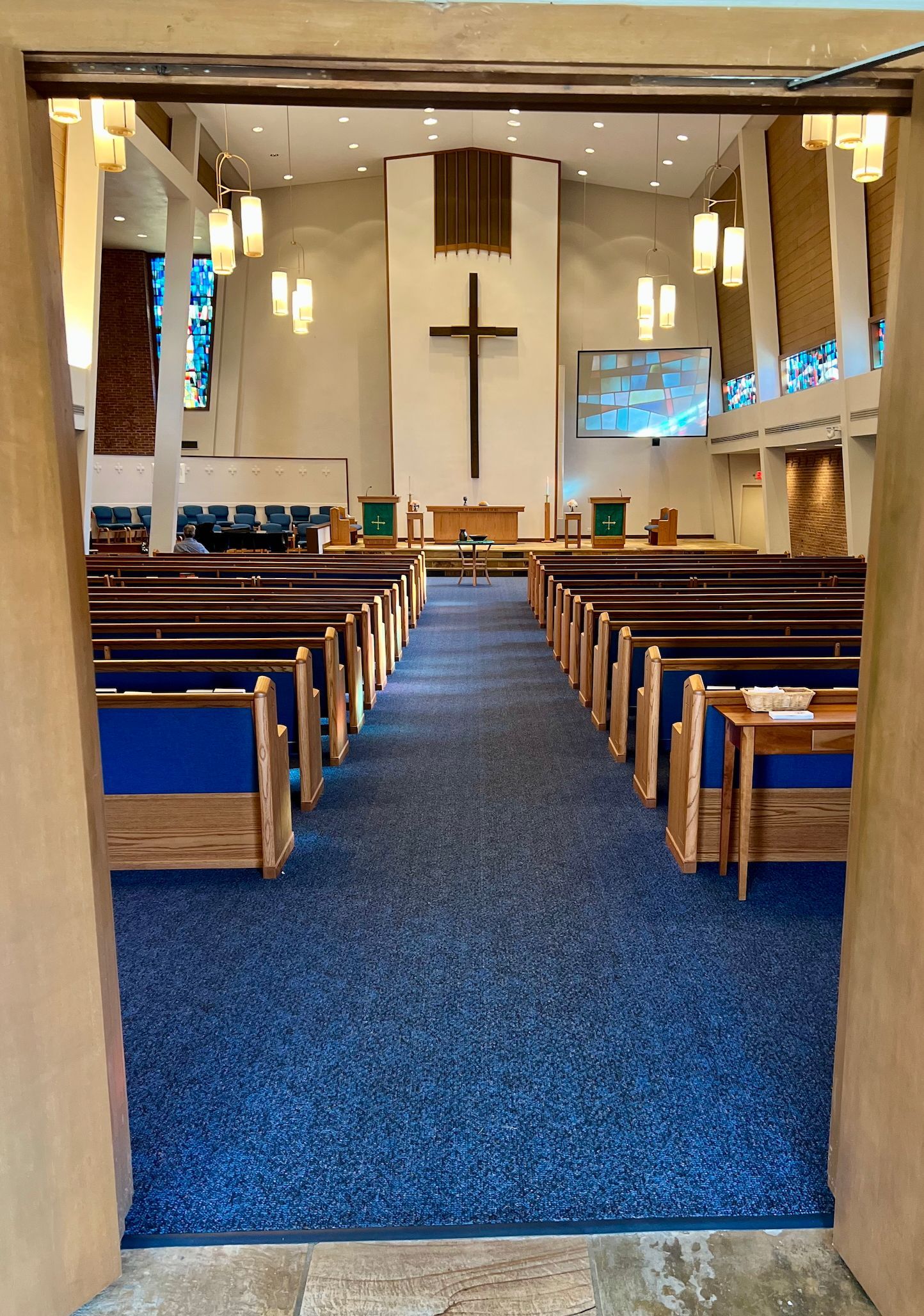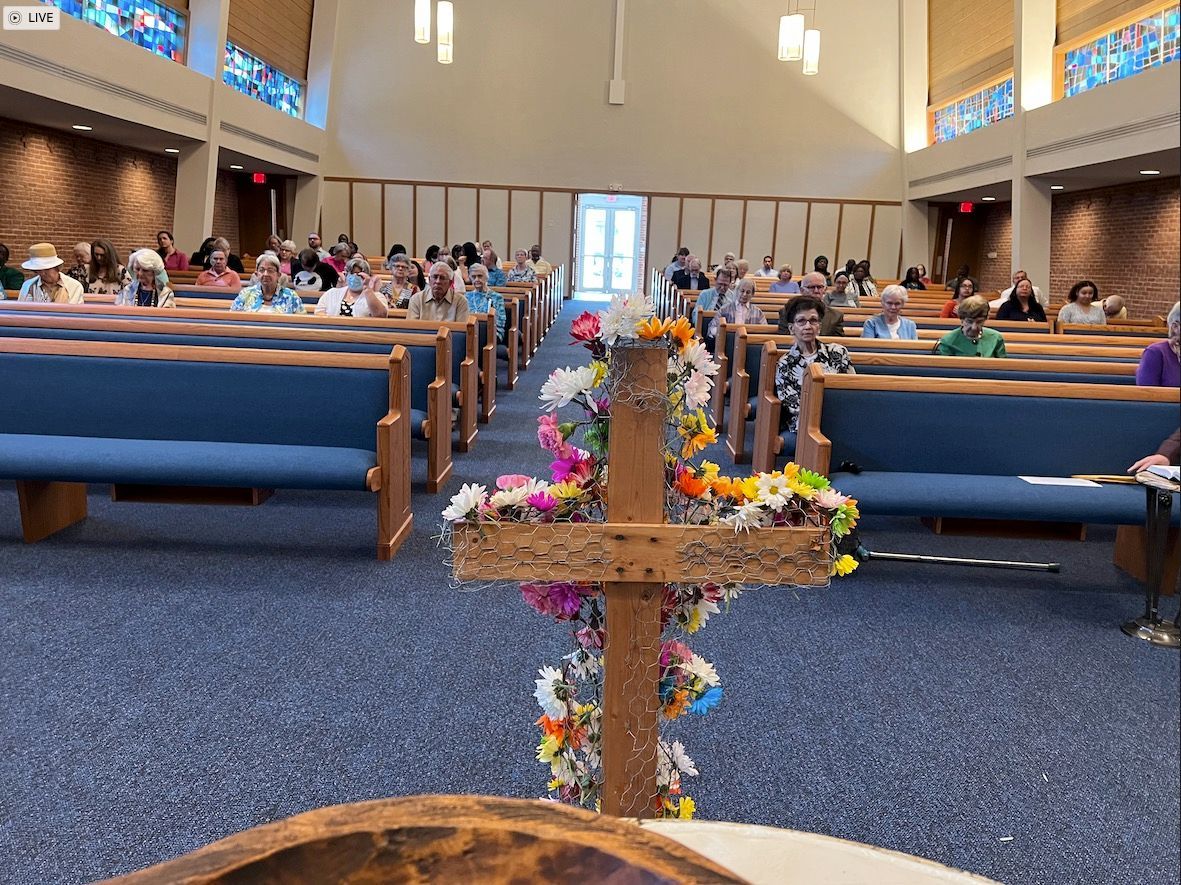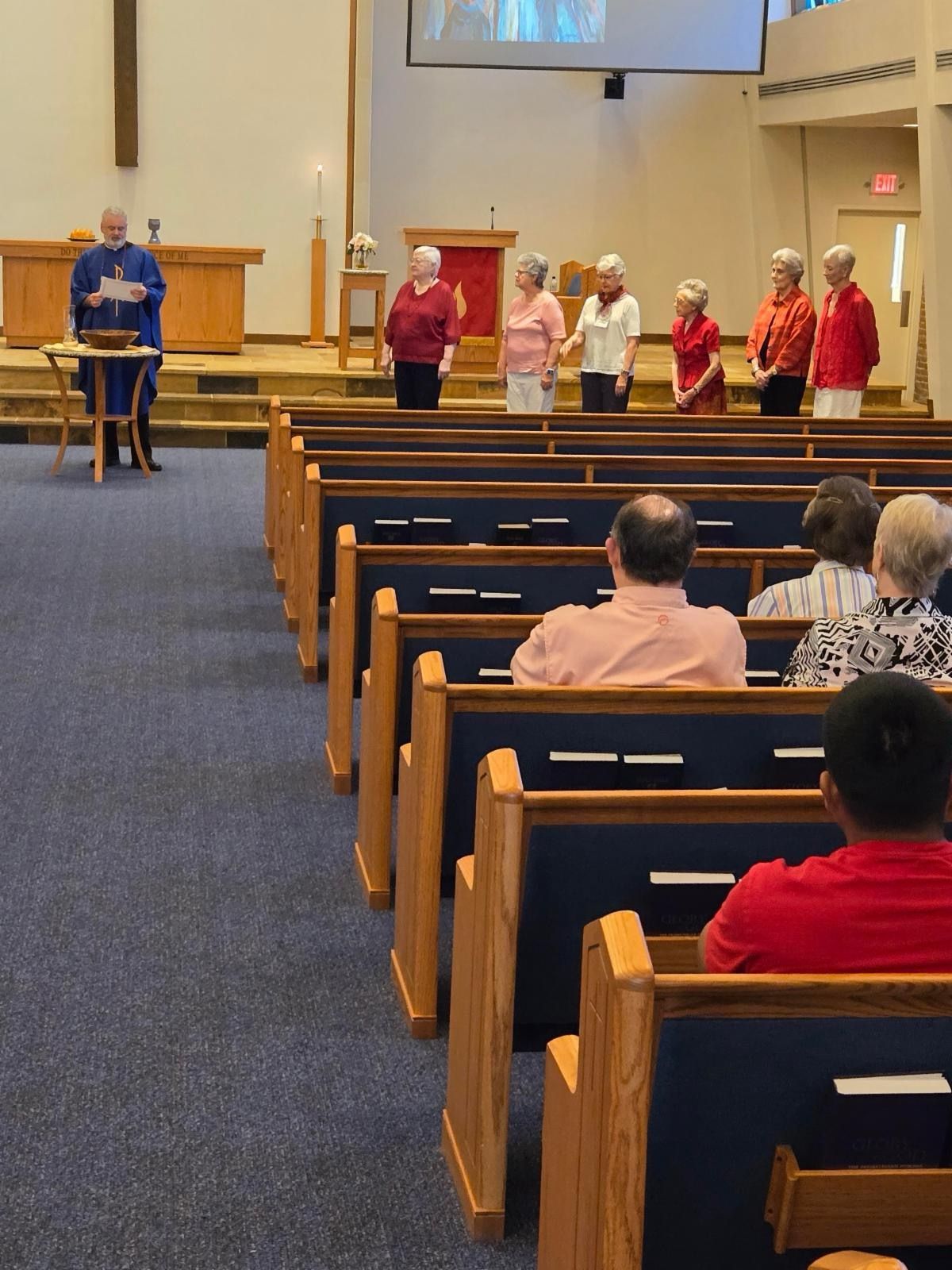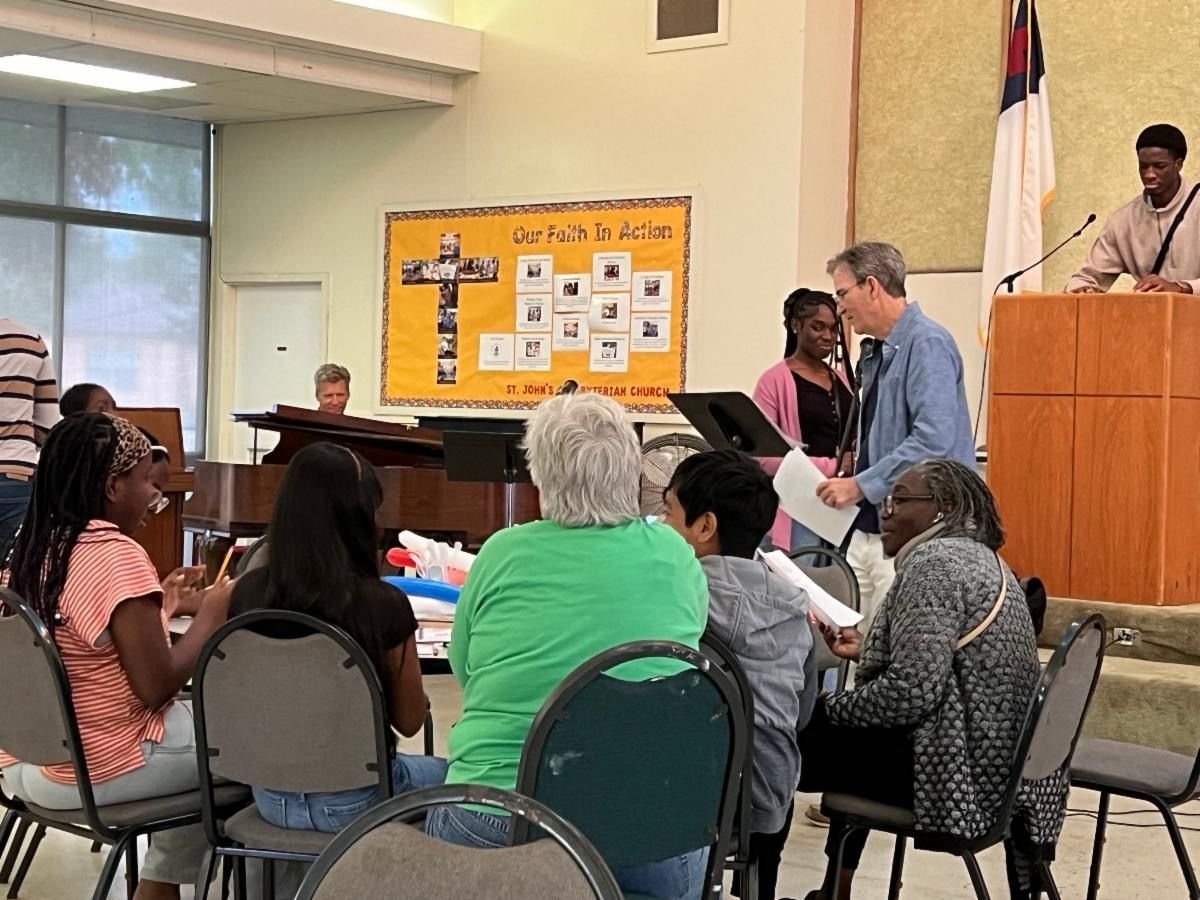About
What We Believe

Presbyterian Beliefs:
What We Believe at St. John's Presbyterian Church
You walk into a church for the first time and wonder what really happens here. Not just on the surface, the hymns and handshakes and coffee in Styrofoam cups. But underneath. What do these people actually believe about God, about themselves, about how the world works?
I'm Pastor Jon at St. John's Presbyterian Church in Houston, and I've been asked that question more times than I can count. Sometimes it comes directly: "What do Presbyterians believe?" Other times it sneaks in sideways: "How is this different from the Baptist church I grew up in?" or "My friend said something about predestination. What's that about?"
Let me give you the honest answer. Not the slick marketing version or the dense theological treatise nobody reads. Just the truth about what shapes how we understand God, ourselves, and this life we're trying to live faithfully.
Why Beliefs Actually Matter
Before we dive into specifics, let's talk about why this matters at all.
Some people treat belief like picking toppings at a frozen yogurt shop. A little of this, some of that, whatever feels right today. That approach sounds open-minded and tolerant. In reality, it leaves you with incoherence. Beliefs that contradict each other don't produce wisdom. They produce confusion.
Presbyterian beliefs form a coherent system. Not because we're trying to be difficult or exclusive, but because truth hangs together. What you believe about God shapes what you believe about humanity. What you believe about sin determines what you think salvation requires. What you understand about Scripture influences everything else.
This matters for how you live. Your beliefs about grace affect how you treat yourself when you fail. Your understanding of God's sovereignty changes how you face uncertainty. Your view of community determines whether you think you can go it alone spiritually or need others.
So when I explain what Presbyterians believe, I'm not reciting a list of abstract propositions. I'm describing the framework that shapes how we actually live Monday through Saturday, not just Sunday morning.
The Authority of Scripture
Let's start where Presbyterians always start: with the Bible.
We believe Scripture is our primary authority for faith and practice. Not our only source of wisdom, but our foundational one. When the Bible speaks clearly on something, that settles it. When it's less clear, we interpret carefully, always checking our conclusions against the whole counsel of Scripture.
This conviction puts us at odds with contemporary culture in at least two directions. Some people treat the Bible as one wisdom source among many, no more authoritative than the Quran, the Bhagavad Gita, or the latest bestselling self-help book. We disagree. We believe Scripture is God's Word written, uniquely inspired by the Holy Spirit to reveal God's character and purposes.
On the other side, some Christians treat every verse as equally important and equally clear, reading everything literally without attention to genre or context. That approach sounds faithful but often misses what Scripture actually teaches. Presbyterians read the Bible seriously enough to pay attention to how it reads itself. Poetry works differently than history. Apocalyptic literature follows different rules than legal codes.
At St. John's, you'll hear sermons that work carefully through biblical texts. We don't use Scripture as a jumping-off point for motivational talks. We wrestle with what these ancient texts actually say and mean, even when they challenge us. Especially when they challenge us.
This commitment to Scripture distinguishes us from approaches that treat spirituality as primarily about personal experience or inner wisdom. We believe God has spoken. Our job isn't to decide what feels true but to understand what God has revealed.
God's Sovereignty: The Foundation of Everything
If you understand nothing else about Presbyterian theology, understand this: we believe in God's sovereignty over all creation.
God isn't a distant clockmaker who wound up the universe and walked away. God isn't a cosmic therapist who gives advice but can't actually change anything. God isn't limited by human freedom or surprised by human choices. God is sovereign. God rules. God governs all things according to his purposes.
That sounds either comforting or terrifying, depending on whether you trust God's character.
Presbyterians anchor God's sovereignty in God's goodness. We're not fatalists who think everything that happens is equally God's will. We don't believe God authors evil or causes suffering. Sin and death are real enemies that God opposes. But we do believe God works through all circumstances, even terrible ones, to accomplish redemptive purposes we can't always see.
This doctrine has practical implications. When you face situations beyond your control, it matters whether you believe God remains sovereign over them. When you pray, it matters whether you think God can actually intervene or just offer moral support. When you suffer, it matters whether that suffering falls within God's redemptive plan or represents God's defeat.
Reformed theology, the tradition Presbyterians inherit, emphasizes God's sovereignty without diminishing human responsibility. We make real choices with real consequences. God doesn't program us like robots. Yet our choices unfold within God's larger purposes. How those two realities fit together perfectly, we don't claim to fully explain. We simply affirm both because Scripture affirms both.
Salvation by Grace Alone
Here's where Presbyterian beliefs get intensely practical and deeply personal.
We believe you are saved by God's grace alone, through faith alone, in Christ alone. Not by your good works. Not by your religious performance. Not by being a decent person who mostly tries. By grace alone.
That phrase, "grace alone," carries more weight than three syllables should bear. It means everything about your standing before God depends on what Christ has done, not what you do. Christ's perfect life, his death on the cross, his resurrection from the dead, these accomplish your salvation. You contribute nothing to it except the sin that made it necessary.
This understanding sets Presbyterians apart from religious systems built on human achievement. You can't earn God's favor by praying enough, serving enough, giving enough, or being good enough. You come to God empty-handed, admitting you have nothing to offer, trusting entirely in Christ's finished work.
Some people hear this and worry it leads to moral laziness. If salvation doesn't depend on good works, why bother trying to live well? The answer comes straight from Scripture: we don't do good works to earn salvation. We do them because salvation transforms us. Grace doesn't excuse sin. Grace breaks sin's power and frees us to live differently.
At St. John's, this theology of grace shapes everything. We confess sin freely in worship because we're confident in God's forgiveness. We admit struggles honestly in community because our worth doesn't depend on appearing perfect. We serve others not to rack up spiritual points but as a response to grace already received.
This differs sharply from approaches that treat spirituality as self-improvement or enlightenment through various techniques. Presbyterian faith begins with the recognition that we're broken and can't fix ourselves. Only God's grace in Christ can make us whole.
Predestination: The Doctrine Nobody Wants to Discuss
Let's address the elephant in the sanctuary: predestination.
Presbyterians believe in election. That means God chose those who would be saved before the foundation of the world. This doctrine makes many people uncomfortable. Some reject it outright as unfair. Others ignore it as too controversial to address.
We don't ignore it because Scripture doesn't ignore it. Paul discusses election extensively in Romans 9-11 and Ephesians 1. Jesus speaks about those the Father has given him. The doctrine appears throughout Scripture, so we can't simply skip over it.
But let's be clear about what we mean and don't mean.
We don't mean God creates people for the purpose of damning them. We don't mean you should agonize over whether you're elect. We don't mean election eliminates the need to respond in faith. We don't mean God's choice makes human responsibility meaningless.
We do mean salvation from start to finish is God's work. God initiates. God calls. God regenerates. God preserves. If left to ourselves, none of us would choose God because sin has corrupted our ability to see clearly and choose rightly. God's electing grace overcomes our resistance and opens our eyes to see Christ's beauty.
Does this raise difficult questions? Absolutely. How can God hold people accountable if he's sovereign over their choices? Why would God choose some and not others? How does divine sovereignty relate to genuine human freedom? These questions have occupied theologians for centuries. We don't claim to have all the answers wrapped up neatly.
What we know is this: everyone who trusts in Christ will be saved. No one who comes to Christ will be turned away. The gospel invitation goes to all people. Your responsibility is to respond in faith. God's sovereignty doesn't nullify that responsibility. It guarantees that those who respond do so because God has worked in their hearts.
If you're still with me after that section, you're doing great. Most people's eyes glaze over when predestination comes up. But I wanted to address it honestly because it's part of who we are as Presbyterians. It's also far less scary in practice than in theory. At St. John's, we focus on the comfort that election brings: if God chose you before you chose him, nothing can separate you from his love.
Justification by Faith Alone
Let's talk about how salvation actually works in your life.
Justification means God declares you righteous based on Christ's righteousness, not your own. This happens the moment you trust in Christ. It's not a process you work through gradually. It's a decisive legal declaration: you are righteous in God's sight because Christ's perfect righteousness is credited to your account.
This doctrine addresses the deepest human anxiety: Am I acceptable? Am I enough? Am I okay?
Religion answers those questions by offering a ladder to climb. Do these spiritual practices. Follow these moral rules. Achieve this level of consciousness. Accumulate enough good karma. Then maybe, possibly, you'll be acceptable.
Presbyterian theology says no. You're acceptable now if you're in Christ. Not because you've achieved anything but because Christ achieved everything on your behalf. His righteousness, credited to you through faith, makes you fully acceptable to God right now.
This removes the performance anxiety that plagues so much religious practice. You don't wake up every day wondering if you've done enough to stay in God's good graces. You're already there, based on Christ's work, not your own.
But here's the crucial distinction: justification isn't the end of the story. It's the beginning. God doesn't just declare you righteous and then leave you unchanged. He also sanctifies you, progressively transforming you to become more like Christ. Justification is instantaneous. Sanctification is lifelong.
This both/and framework prevents two errors. Some people think salvation means God accepts you as you are and never expects change. Others think salvation requires constant effort to maintain God's approval. Presbyterian theology says God accepts you completely in Christ, then works in you to actually change you over time. Grace covers you entirely while grace transforms you progressively.
The Priesthood of All Believers
Presbyterians inherited this conviction from the Protestant Reformation: there's no special spiritual elite who mediate God's presence to regular Christians.
Every believer has direct access to God through Christ. You don't need a priest to confess your sins. You don't need a pastor to read the Bible for you. You don't need anyone else's permission to pray. Christ is the only mediator between God and humanity.
This doesn't mean pastors and elders are unnecessary. It means their role is different than in some traditions. Presbyterian leaders aren't mediators. We're equippers. We teach Scripture, provide pastoral care, give spiritual guidance, and help the congregation discern God's will. But we don't stand between you and God.
This priesthood of all believers shapes how St. John's functions as a community. We expect every member to read Scripture personally, to pray directly to God, to discern God's calling, to use their spiritual gifts in service. The church isn't divided into clergy who do ministry and laity who receive ministry. We're all ministers in different ways.
Women serve as elders at St. John's because we're part of the PC(USA), which recognizes that the Holy Spirit gifts people for leadership regardless of gender. This reflects our conviction about the priesthood of all believers. God distributes gifts as the Spirit determines, not according to human categories.
The Centrality of Community
Individual spirituality isn't enough. Let me say that again because it runs counter to so much contemporary thinking: individual spirituality is not enough.
You cannot be a faithful Christian alone. You need the church. Not as a helpful addition to your personal faith but as essential to it. The New Testament knows nothing of solitary Christianity. Faith is corporate by nature.
Presbyterians take this seriously through our polity. We don't have independent congregations doing whatever seems right to each individual church. We're connected in presbyteries, regional bodies where churches work together, hold one another accountable, and share resources. Individual congregations belong to presbyteries. Presbyteries belong to synods. Synods belong to the General Assembly.
This connectional structure reflects our theology. We're parts of a body, not isolated individuals. What happens in one congregation affects others. We bear one another's burdens across geographic and demographic lines.
At St. John's, this plays out in how we practice membership. Joining our church means making promises to participate actively, give financially, serve regularly, and live under the authority of our elders. It's not a casual affiliation. It's a covenant commitment.
We also take discipline seriously. Not in harsh or judgmental ways, but in the biblical sense of helping one another grow in holiness. If a member lives in persistent, unrepentant sin, the elders will address it. Not to shame them but to restore them. The goal is always restoration, not punishment.
This communal emphasis distinguishes Presbyterian faith from "spiritual but not religious" approaches that value personal experience over corporate commitment. We believe Christian formation happens through rubbing shoulders with other believers, submitting to communal wisdom, and serving together in mission.
Presbyterian Church Government
I know what you're thinking: church government sounds about as exciting as watching paint dry. But how a church organizes itself reveals what it believes about authority, leadership, and community.
Presbyterians practice representative government. We elect elders who govern the church on our behalf. The word "Presbyterian" comes from the Greek word for elder, "presbuteros." Elders matter to who we are.
But elders aren't a separate class of super-Christians. They're members of the congregation who meet biblical qualifications and are called to serve in this particular way. At St. John's, our Session (the governing body of elders) makes decisions about church life, provides spiritual oversight, and guides our mission and ministry.
This form of government sits between two extremes. We're not congregational, where every member votes on every decision. We're not episcopal, where bishops govern multiple congregations. We're presbyterian: we elect representatives who govern together.
Decisions at St. John's require eldership approval. I'm the pastor, but I don't run the church like a CEO. I'm one voice among several on Session. This checks pastoral power while maintaining effective leadership. It also means decisions take longer and require more conversation. That's by design. We believe wisdom emerges from communal discernment, not top-down decrees.
Beyond the local congregation, St. John's participates in New Covenant Presbytery, our regional body. The presbytery ordains ministers, provides accountability for churches, and coordinates shared mission. We also relate to the PC(USA) General Assembly, which meets biennially to set denominational policy and direction.
This connectional system means we're not isolated. We belong to something larger. That provides resources we couldn't generate alone while holding us accountable to standards beyond our own preferences.
Two Sacraments: Baptism and the Lord's Supper
Presbyterians recognize exactly two sacraments because Jesus commanded exactly two: baptism and the Lord's Supper. These aren't mere symbols or empty rituals. They're means of grace, ways God strengthens faith and communicates spiritual reality.
We baptize infants and adults because we believe baptism signifies God's covenant promise. Just as God made promises to Abraham and his children, God makes promises to believers and their children. Baptism marks that promise visibly. The water doesn't save, but it enacts grace, showing that God claims this person as his own.
When we baptize a baby at St. John's, we're not suggesting the child is automatically saved or that baptism works like magic. We're declaring God's promise to be this child's God. We're committing as a congregation to nurture this child in faith. The parents are vowing to raise their child in the knowledge and love of God. And we're trusting that God's Spirit will work in this child's heart as they grow.
Adults who were never baptized receive baptism when they profess faith in Christ. Adults already baptized in another Christian tradition don't get rebaptized. We recognize one baptism, regardless of when or where it occurred.
The Lord's Supper, which we celebrate monthly, isn't a mere memorial meal. Christ is truly present by his Spirit when we share bread and wine. We don't believe the elements literally become Christ's body and blood. But we don't think communion is just remembering either. Christ nourishes us spiritually through this meal, strengthening our union with him and with one another.
Communion at St. John's is open to all who trust in Christ. We don't require Presbyterian membership or perfect understanding. We invite anyone who acknowledges their sin, trusts in Christ for salvation, and commits to follow him. Children receive communion at the discretion of their parents. If you feel comfortable with your child receiving communion, so do we. If you are unsure, talk to the Pastor.
These sacramental practices embody Presbyterian convictions about grace, community, and God's initiative in salvation. We don't do them because they're pretty traditions. We practice them because they're means God uses to build faith.
What About Social Issues?
I'd be dishonest if I didn't address this directly. The PC(USA) has taken positions on various social and political issues that some members celebrate and others find troubling.
St. John's exists within the PC(USA), which means we're connected to a denomination that ordains women and LGBTQ individuals, supports abortion rights in certain circumstances, and advocates for progressive social policies on issues from climate change to immigration.
Individual congregations and members within the PC(USA) hold diverse views on these matters. We're not a monolith. Some Presbyterian churches and members align fully with denominational positions. Others disagree sharply while remaining in fellowship.
At St. John's, we focus on what unites us: the authority of Scripture, salvation by grace through faith in Christ, and mission to serve our neighbors in Jesus' name. We recognize that faithful Christians applying biblical principles sometimes reach different conclusions on complex issues.
What matters most isn't perfect agreement on every social question. What matters is that we handle disagreements with grace, remain committed to Scripture, and keep the gospel central. I won't pretend these issues are unimportant. But they're secondary to the core convictions that define Christian faith.
If you're considering St. John's and you're concerned about where we stand on a particular issue, come talk with me. I'll give you honest answers. Our goal is to be a community where people who love Jesus and take Scripture seriously can wrestle with difficult questions together without fracturing.
Reformed Theology in Plain Language
All these beliefs I've described flow from what's called Reformed theology. That's the theological tradition born from the Protestant Reformation, particularly from John Calvin's work in Geneva and John Knox's ministry in Scotland.
Reformed theology emphasizes certain themes:
God's sovereignty over all creation and human history. Human sinfulness and our inability to save ourselves. Salvation as entirely God's work from start to finish. Scripture as the supreme authority for faith and life. The church as God's covenant community. The Christian life as one of growing obedience and service.
These emphases distinguish Reformed theology from other Christian traditions. We're not Arminian, emphasizing human free will in salvation. We're not Catholic, recognizing the Pope's authority or tradition as equal to Scripture. We're not fundamentalist in the sense of reading everything literalistically or separating from other Christians over secondary issues.
Reformed theology offers a comprehensive worldview that addresses not just personal salvation but God's purposes for all creation. It values both heart and mind, both personal piety and cultural engagement, both worship and work.
At St. John's, you won't hear us use the term "Reformed theology" constantly. Most of our members couldn't give you a lecture on Calvin's Institutes. But Reformed convictions shape how we read Scripture, how we understand grace, how we practice community, and how we engage our city in mission.
Living Into These Beliefs
Beliefs matter most in how they're lived.
At St. John's, Presbyterian theology produces certain characteristics:
We take Scripture seriously enough to wrestle with difficult texts. We're comfortable with questions and doubt because we trust God's grace doesn't depend on perfect understanding. We practice community that requires actual commitment, not just attendance. We serve our neighbors through partnerships with Braes Interfaith Ministries, Presbyterian Children's Homes and Services, and a Uganda orphanage. We worship in ways that engage both mind and heart. We elect leaders who govern together rather than concentrating power in one person. We baptize children and adults as signs of God's covenant promise. We share communion as a means of grace that strengthens faith.
These practices embody our beliefs. You could read systematic theology textbooks for years and still miss what Presbyterian faith actually looks like. Come worship with us on Sunday morning and you'll see these beliefs in action.
Why Choose Presbyterian Faith?
You might be wondering: with all the Christian traditions out there, why choose Presbyterian?
I won't claim we're the only faithful Christians. God works through many denominations and traditions. But Presbyterian faith offers some distinctive gifts:
A coherent theological system that hangs together intellectually while remaining grounded in Scripture. A form of government that balances accountability with local autonomy. A tradition that values education, asking hard questions, and thoughtful engagement. A commitment to both personal piety and social justice. An understanding of grace that frees you from religious performance anxiety. A view of community that takes commitment seriously without becoming cult-like.
Presbyterian faith works particularly well for people who can't turn off their brains when they enter church. If you need your faith to make sense intellectually while also touching your heart, Presbyterian theology offers that integration. If you're tired of choosing between churches that are all heart and no head or all head and no heart, we provide a third way.
What We Believe at St. John's
Let me bring this home to our specific congregation.
St. John's Presbyterian Church in Houston stands within the Reformed tradition and the PC(USA). We believe everything I've outlined in this article, but we emphasize certain things in how we live it out.
We prioritize authentic relationships over programmatic success. We'd rather be a smaller church where people genuinely know each other than a large church where most members remain anonymous.
We focus on mission that serves real needs in our community. We're not about maintaining our institution. We're about serving our neighbors in Jesus' name through practical ministries that feed the hungry, support struggling families, and care for children who need safety and stability.
We practice worship that's intellectually honest and emotionally authentic. You won't hear manipulative appeals or shallow theology. You also won't sit through dry lectures that don't touch the heart. We aim for the integration of mind, heart, and hands.
We welcome questions and doubt as part of faithful discipleship. You don't have to have everything figured out to belong here. You just have to be honest about where you are and willing to keep seeking.
We expect commitment because we believe Christian formation happens through steady participation in community, not occasional dabbling. But we also recognize that people come to that commitment at different paces.
These emphases shape everything we do. They're how Presbyterian beliefs translate into daily church life in one corner of Houston, Texas.
Your Next Step
If what I've described resonates with you, the next step is simple: visit us.
Come to Sunday worship at 11:00 AM and experience Presbyterian faith in action. Hear how we preach Scripture. Participate in our liturgy. Share communion with us. Meet the people who make St. John's their church home.
After worship, grab coffee and ask questions. I'm usually available to talk, as are our elders and long-time members. We don't bite, and we welcome honest inquiry.
If you're more introverted or need time to think before diving into conversation, that's fine too. Come, worship, observe, and return when you're ready to engage more deeply.
You don't have to agree with everything I've written to visit. You don't have to become Presbyterian to be welcome. You just have to be genuinely seeking to understand what faithful Christian life looks like.
Presbyterian beliefs form a coherent system rooted in Scripture and tested through centuries of faithful practice. These aren't arbitrary rules or cultural preferences. They're convictions about who God is, what God has done in Christ, and how God calls us to live together as his people.
At St. John's, we're trying to live these beliefs faithfully in Houston in 2025. We don't do it perfectly. We're a congregation of sinners saved by grace, still being sanctified, still learning what it means to follow Jesus in community. But we're committed to the journey, and we welcome companions along the way.
If you've been searching for a church home where theology matters, community is real, and mission drives everything, St. John's Presbyterian might be exactly what you're looking for.
Come see us. Ask your questions. Experience worship with us. Discover whether Presbyterian faith provides the framework you've been seeking for understanding God, yourself, and the life you're called to live.
St. John's Presbyterian Church 5020 West Bellfort Avenue Houston, TX 77035 (713) 723-6262 www.stjohnspresby.org
Sunday Worship: 11:00 AM
We're not perfect. But we're real. And we're here, ready to walk alongside you as you seek to understand and live out faithful Christian discipleship in the Presbyterian tradition.
Deeper Dive into Our Beliefs
You may want to read this blog post to learn more about our Presbyterian Theology Houston: How Core Beliefs Shape Worship at St. John's. Another option is to choose another topic from our church blog which has many articles about different aspects of our church and our life as disciples of Jesus Christ.




